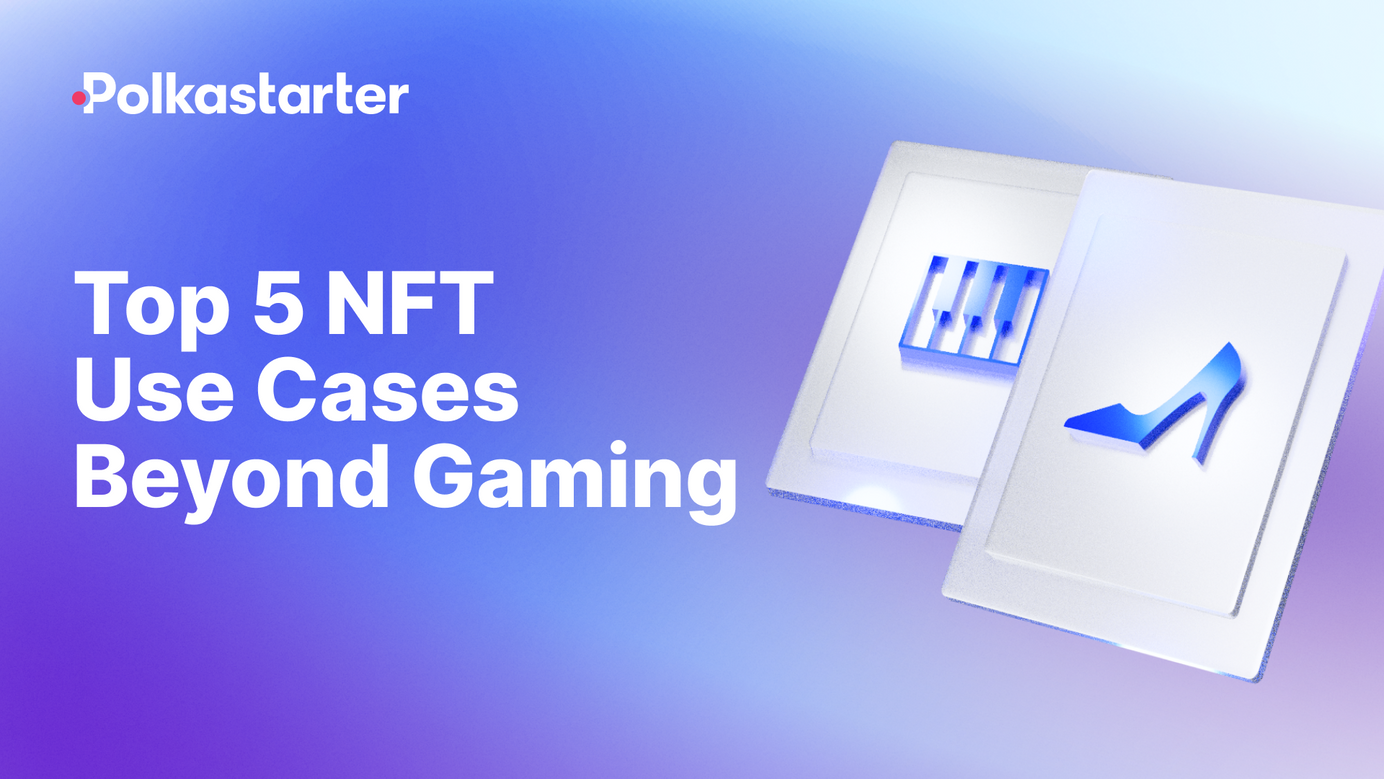
Top 5 NFT Use Cases Beyond Gaming
Sky’s the ceiling? Nah. NFTs are meant for a lot higher than that.
We’ve talked about the future of NFT marketplaces and the future of NFTs regarding utility. The three-letter acronym is dominating crypto news for the past 18 months, and if we had to choose one vertical that’s been constantly tied to non-fungible tokens, that would be none other than gaming. While the NFT-gaming match is undeniable, there’s a lot more we’ll see from NFTs in the near future.
Today, we’ll look closely at the top 5 NFT use cases beyond gaming. Let’s get right to it.
Music
The music industry has recorded its own maturity journey in the past 50 years. From vinyl to cassettes, records and CDs to streaming and YouTube, this is a space that has changed paradigms and parameters more than once.
The advent of NFTs is yet another turning point in this exciting and storied journey. Here’s how NFTs will impact the music industry in years to come:
- Artists will be able to tokenize their songs and albums
- Sell digital merchandise to create an additional source of income. (limited digital assets)
- Allow creators to keep all the profits and royalties without paying a part of their earnings to a production label or streaming platform
- Introducing ownership and true scarcity
How far are we from musicians releasing their music as NFTs? Apparently, not far at all. This is actually happening and is making headlines for those who care to pay attention. Well-known band ‘Kings of Leon’ became the first band to release an album as an NFT. The perks coming with buying their NFT? Four front-row seats to the show of their choice during each tour for life. Pretty impresvie, right?
This is another aspect of music that will change. The marriage of physical items and exclusive perks that come with buying music as an NFT. The potential is endless, and we can’t wait to see how it all unfolds.
Fashion
How would you feel about clothes, shoes, and accessories you can’t wear? Bear with us. NFTs have given brands a digital outlet to create fashion art that is both unique and scarce. The examples are impressive, with Gucci having sold a digital-only bag on Roblox for $4,115. At the same time, Dolce & Gabbana followed the hybrid physical-digital model we mentioned above, auctioning a 9-piece NFT for $5.65 million. The piece included 5 physical pieces with NFT versions for metaverse and 4 digital-only pieces.
Why would someone spend money on digital clothing? That’s a good question. These collectables will develop their own marketplaces and value, allowing owners to trade them. Moreover, they will be able to dress their own avatars in the metaverse.
Supply Chain
The supply chain refers to the network, and workflow of all the people, businesses, resources, initiatives and technology involved in the creation and sale of a product. How do NFTs impact this process?
In numerous ways:
- Product metadata is timestamped, verified, immutable, and stored on the blockchain
- End-to-end tracking of goods from factory to destination
- Digital documentation, invoicing and maintenance
- Authenticating and verifying goods
- Preventing counterfeiting and fakes
This area can redefine the speed with which goods are delivered and eliminate fake, second-hand scam markets. Goods will be priced fairly, and consumers will be assured they receive what they paid for.
Ticketing
This might come as complementary to the music industry but can also apply to events of all types, such as sporting events, theatre, cinema, festivals and more. We now book tickets online and get the digital barcode on our phone wallets. Pretty simple and easy, right? How much better can it get? A lot, actually.
NFTs can improve the ticket industry by:
- Eliminate the 3rd party ticket seller between the artists and fans. (Ticketmaster, Seedgeek, and more)
- Decrease scams by authenticating tickets
- Ticket reselling and exorbitant fees will be wiped out
- No bots, no stealing during releases. An equal opportunity for everyone to get a ticket
This process benefits both the artist and the consumer, adding an extra layer of protection, transparency and profitability.
Patenting
We’ve briefly talked about intellectual property (IP) in the metaverse. To build on that discussion, we can see NFTs playing a massive role in the way we patent ideas, products and inventions. Patent holders will be able to tokenise patents as NFTs. With the help of smart contracts, patents will be stored, managed and tracked on the blockchain with no fear of mischievous actions. Patenting suddenly becomes fast, accessible, and transparent.
Closing remarks
This list could have been much longer, but the idea across all use cases is the same: NFTs have the power and potential to change businesses, sectors and industries that have been stuck in the mud for decades on end. We’ll be here to observe and report, so make sure you check back with us.
About Polkastarter
Polkastarter is the leading decentralized fundraising platform enabling crypto’s most innovative projects to kick start their journey and grow their communities. Polkastarter allows its users to make research-based decisions to participate in high-potential IDOs, NFT sales, and Gaming projects.
Polkastarter aims to be a multi-chain platform and currently, users can participate in IDOs and NFT sales on Ethereum, BNB Chain, Polygon, Celo, and Avalanche, with many more to come.
